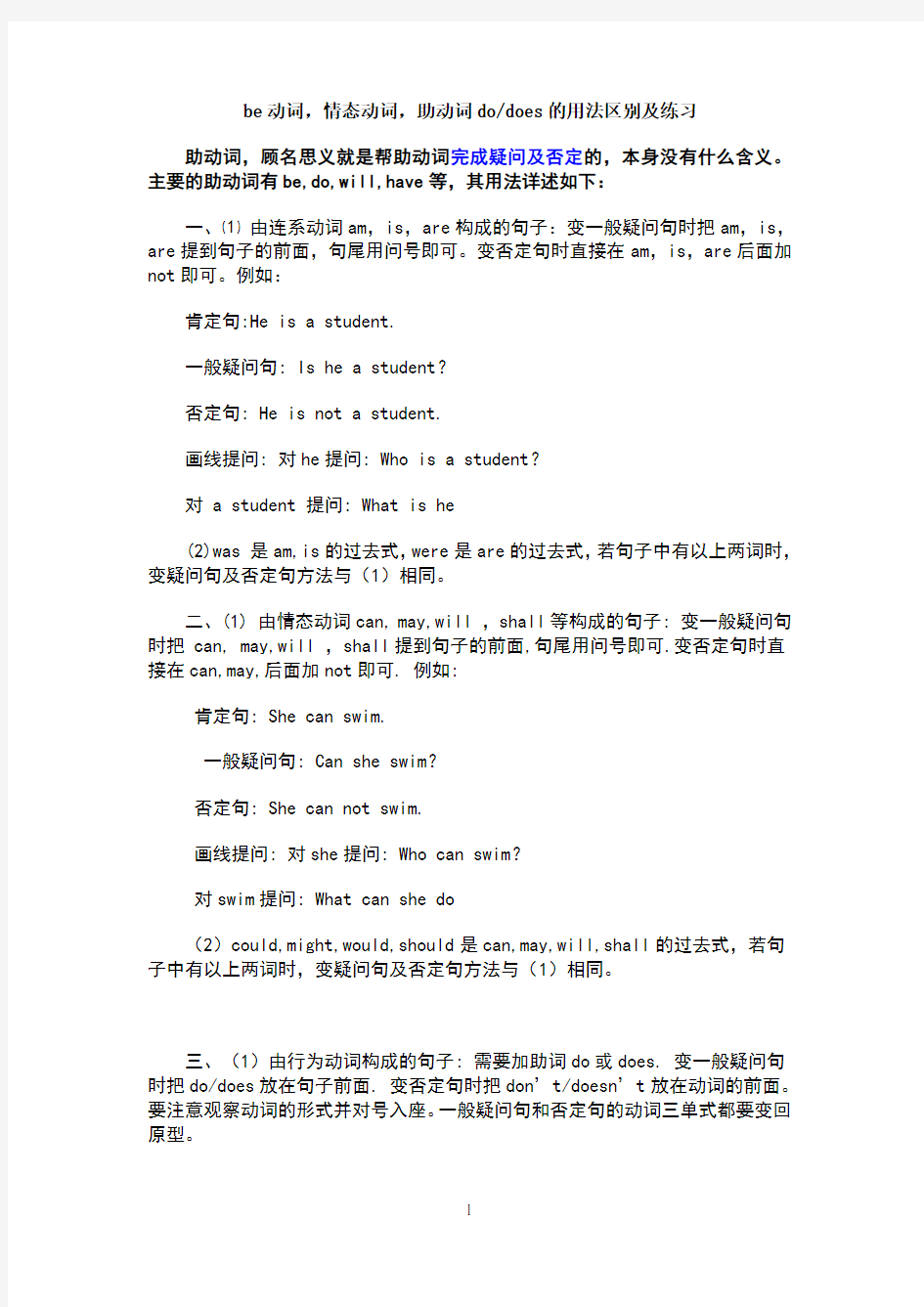
助动词用法及练习
- 格式:doc
- 大小:28.50 KB
- 文档页数:6


be动词,情态动词,助动词do/does的用法区别及练习
助动词,顾名思义就是帮助动词完成疑问及否定的,本身没有什么含义。主要的助动词有be,do,will,have等,其用法详述如下:
一、⑴由连系动词am,is,are构成的句子:变一般疑问句时把am,is,are提到句子的前面,句尾用问号即可。变否定句时直接在am,is,are后面加not即可。例如:
肯定句:He is a student.
一般疑问句: Is he a student?
否定句: He is not a student.
画线提问: 对he提问: Who is a student?
对 a student 提问: What is he
(2)was 是am,is的过去式,were是are的过去式,若句子中有以上两词时,变疑问句及否定句方法与(1)相同。
二、(1) 由情态动词can, may,will ,shall等构成的句子: 变一般疑问句时把 can, may,will ,shall提到句子的前面,句尾用问号即可.变否定句时直接在can,may,后面加not即可. 例如:
肯定句: She can swim.
一般疑问句: Can she swim?
否定句: She can not swim.
画线提问: 对she提问: Who can swim?
对swim提问: What can she do
(2)could,might,would,should是can,may,will,shall的过去式,若句子中有以上两词时,变疑问句及否定句方法与(1)相同。
三、(1)由行为动词构成的句子: 需要加助词do或does. 变一般疑问句时把do/does放在句子前面. 变否定句时把don’t/doesn’t放在动词的前面。要注意观察动词的形式并对号入座。一般疑问句和否定句的动词三单式都要变回原型。
play-----do plays-----does
例如:
肯定句: They play football after school. He plays football after school.
一般疑问句: Do they play football after school Does he play football after school?
否定句: They don't (do n ot) play football after school. He doesn’t’ play football after school.
画线提问: 对they/he提问: Who plays football after school
对play football提问: What do they do after school What does he do after school?
对after school提问: When do they play football When does he play football
(2)did是do和did的过去式,变一般疑问句时把did放在句子前面. 变否定句时把didn’t放在动词的前面, 要注意观察动词的形式并对号入座。一般疑问句和否定句的动词都要变回原型。
四、(1)由have,has构成的现在完成时句子,变一般疑问句时把have,has 提到句子的前面,句尾用问号即可。变否定句时直接在have,has后面加not即可。例如:
肯定句:He has read today’s newspaper.
一般疑问句: Has he read today’s newspaper.?
否定句: He has not read today’s newspape
画线提问: 对he提问: Who has read today’s newspaper?
对today’s newspaper提问: What has he did
(2)had是have和has的过去式,在构成的过去完成时句子中,变一般疑问句时把had提到到句子的前面,句尾用问号即可。变否定句时直接在had
后面加not即可。
(3)若have,has,had没有出现在完成时的句子中,则当实义动词对待,请参考实义动词的用法。
五、第一人称I,we在变疑问句时,应变为第二人称you。“I am, you /we /they are”这是初一最简单的固定搭配,不应再唠叨了吧!
六、is,has,does用于第三人称的现在时态,was用于第三人称的过去时态。
针对性练习
按要求改写句子:
have been to Beijin(一般疑问句)
______ ______ __________ to Beijin?
can see some birds.(一般疑问句)
______ ______ see ______ birds?
designs clothes.(一般疑问句)
______ he ________ clothes?
were s ome flowers on the teachers’ desk.(一般疑问句)
______ ______ ______ flowers on the teachers’ desk?
were some apples on the tree.(否定句)
There ______ ______ ______ apples on the tree.
think he is very old.(否定句)
I ______ think he ______ very old.
colour it green.(否定句)
______ ______ colour it green.
had lunch(变否定句)
______ _______ ______ __________.
may have some hot dogs.(一般疑问句)
_______ ______ ______ ______ ________.
aren’t any pears in the box.(同义句)